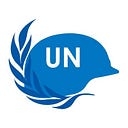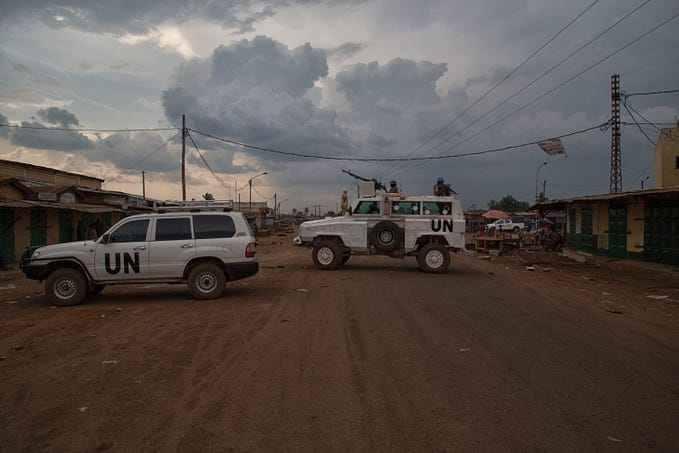Four ways UN Peacekeeping supports education for peace | #EducationDay
By: Maya Kelly

Around the world, 222 million crisis-hit children are missing out on essential classroom time.
Conflict, displacement and climate disasters are robbing children of the chance to study and unlock their dreams of becoming doctors, engineers, scientists, teachers, and more.
A 2022 report released by the UN global fund for education in emergencies and protracted crises, Education Cannot Wait (ECW), found that since 2016, the number of crisis-impacted school-aged children grew from 75 million to 222 million; a devastating 196% increase.
Though education is not a core responsibility within our mandates, UN peacekeepers go above and beyond to support students and teachers, and provide educational opportunities, infrastructure and materials to the communities they serve.
As we mark World Education Day, learn about four ways that UN Peacekeeping supports education:
(1) Building schools and donating learning materials
SOUTH SUDAN
Elementary students in Aweil East, South Sudan are used to outdoor learning and the obstacles that come with it — soggy textbooks, leaves falling mid-lesson, and pens and notebooks blown away by mighty winds. However, thanks to a Quick Impact Project by the UN Peacekeeping Mission in South Sudan (UNMISS), the days of studying under a tree are over for the 1,000 pupils of Lietnhom primary school.
Now, students study in three classrooms, fully equipped with a roof, walls, desks, chairs, and even a bathroom. This UNMISS-funded infrastructure enables pupils to continue their studies during South Sudan’s rainy season, roughly May to November, which previously caused class cancellations due to flooding.
(2) Stepping in as teachers
SOUTH LEBANON
Following the re-appearance of cholera in Lebanon after nearly three decades, Ghanaian peacekeepers serving with the UN Peacekeeping Mission in Lebanon (UNIFIL) initiated cholera education classes in elementary schools to educate students and teachers on sanitation and prevention measures.
In addition to educating students on cholera transmission and preventive practices, including proper hand-washing procedures, the Ghanaian peacekeepers donated Personal Protective Equipment (PPE) and sanitation items to help keep students and teachers safe.
ABYEI
In Abyei, Indian peacekeepers serving with UNISFA work to spread peace and harmony through education, providing classes to children and adults of the Dokura and Noong Villages who otherwise are unable to attend school.
The initiative has garnered an overwhelmingly positive community response, resulting in increased attendance from local youth. UNISFA peacekeepers plan to extend the classes, which include reading and mathematics, into surrounding villages in the coming weeks.
(3) Protecting students
CENTRAL AFRICAN REPUBLIC
After a 16-year hiatus, students can return to school in Ouandja-Kotto sub-prefecture, in the Central African Republic (CAR) thanks to the UN Peacekeeping mission (MINUSCA).
Since 2006, the sub-prefecture has been governed by armed groups. Thousands of children were prevented from accessing education, with some children being forcibly recruited to armed groups or used in the fields and mining sites, while many girls were forced into early marriage.
The return of school to this locality in October 2022 was made possible after the deployment of MINUSCA forces in the area, which deterred armed groups.
“The population is beginning to go about its business freely and schools are also beginning to operate,” explains senior government official, Malick Adoum.
A MINUSCA donation of school supplies to more than 2,000 elementary and middle school students further aided the return of students to classrooms.
(4) Educating prison detainees
MALI
Providing literacy programs in prison improves detainees’ chances of social reintegration after incarceration. For some 60 detainees of the Timbuktu Remand and Correctional Center in Mali, MINUSMA Peacekeepers provide the opportunity to take literacy courses in French and English, as well as Songhai and Tamasheq, the national languages of the region.
Colonel Harouna TANGARA, Regional Director of Penitentiary Administration, explains that, “these literacy courses in the Songhai and Tamasheq national languages are more than a right for prisoners. The acquisition of new knowledge and skills makes the prisoner a new person, useful to society”.
Detainees are equally grateful for the chance to learn. “We learn things through the languages we speak every day. I am especially happy with the English lessons. It is a language that I love and that I would like to be able to speak and write,” explains M.Y., a young detainee.
Following the three-month literacy course, the rate of illiterate prisoners is reduced, and upon release, detainees re-enter society with the ability to read, greatly increasing their likelihood of securing employment and reducing their risk of recidivism.
_______________________________________________________________
Learn more about the International Day of Education, and the 2023 theme: “To invest in people, prioritize education”.










